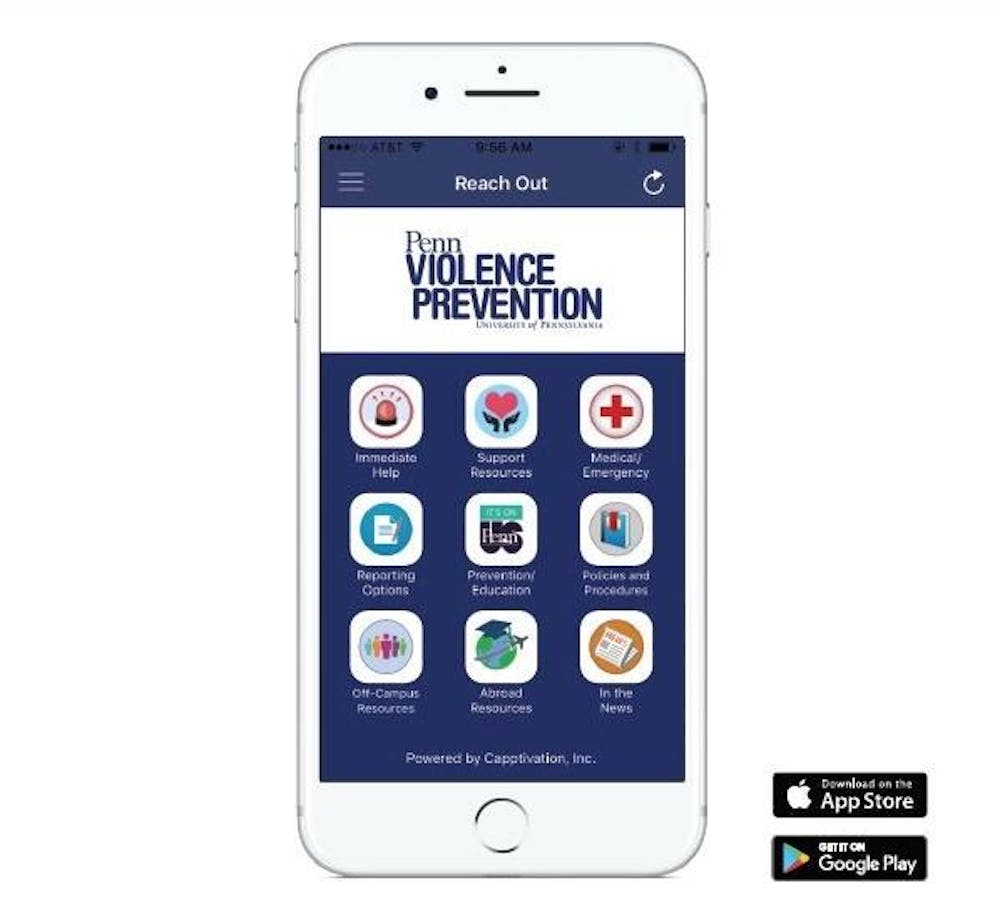Stories from assault survivors stress the healing power that friendship can have in dark times, that openness and support and family and love can be a salve. While the importance of support is well understood, things are often murkier for survivors when it comes to taking the next step and reporting their assault. It’s why rape is one of the most underreported crimes in the country.
In 2014, then–sophomore Sarah Zandi (C’17) began working with her brother Jack on Reach Out Editions, an app–based resource center he’d developed to help minimize the obstacles preventing college women from reporting assaults. In the past year, Sarah’s worked closely with the Penn Violence Prevention (PVP) office to design Penn’s page on the app and populate it with relevant on–campus and local resources.
Photo courtesy of: Penn Violence Prevention
“There are so many resources at and around Penn, and they aren’t really organized in any way,” says Sarah.
The app, which freshmen were asked to download during NSO in August, is equipped with a unique homepage for nearly every college in the United States, as well as many high schools, military bases, and international universities. It's the first app of its type that Jack and his development team, Capptivation, have created, although its success could inspire more from them down the line. The standard homepage includes a gallery of modules for things like medical/emergency resources, support resources, and off–campus resources. Each page is assembled independently by the Reach Out team, although organizations can work with the developers to further customize their pages.
But while PVP’s customized Reach Out page offers a succinct and easy–to–navigate catalogue of nearly any information a Penn student in crisis could need, PVP director Jessica Mertz says that the app has only had 231 traceable and confirmed downloads so far on campus (measured by the number of times the app was sorted into a folder with other Penn-related apps). “It’s one thing to get people to download [the app],” says Jessica. "It’s another to get them to keep it on their phone and see it as something that could be important to them.”
Katie Chockly, PVP’s program coordinator, spent months brainstorming new features for Reach Out that could help encourage students to keep it on their phones. The app contains a specialized module designed to centralize sexual-assault related news at Penn, as well as a feature that allows users to book PAVE training sessions and other PVP resources for clubs.
According to Jessica, Penn’s 2015 American Association for Universities (AAU) Campus Climate Survey revealed that one of the major barriers to reporting sexual assault is that victims often think their experience aren't serious enough to warrant support. The other big barrier? Fear of social consequences.
“That’s the barrier we can really engage students in thinking about,” says Jessica. “We want students who are reporting to feel that they have a say in the process and that they will be able to make decisions every step of the way about what feels best for them. Our primary concern is always getting them support and making them feel safe on campus.”
“Sometimes when people hear ‘report’ they think ‘opening an investigation’,” adds Katie. “But there’s not going to be an investigation unless you want there to be one.”
Sarah reiterates what a powerful barrier fear of social consequence or a public investigation can be. At Penn, she says, she was shocked to see first–hand that it can take years for victims to feel safe speaking out. “I don’t think I realized how bad it was at Penn until I was probably a junior, and I was meeting more people,” she recalls. “Every semester it hit closer and closer and closer to home. A lot of people are more willing to tell you about it after the fact, once it’s been a few years. And it wasn’t really even Penn specifically that convinced me. At Penn, and on a national scale…there’s an enormous problem.”
Can the ease of Reach Out’s platform, especially outfitted with PVP’s modifications, really help mitigate the social barriers students face in reporting sexual assault? Sarah is certain of it—she’s only received positive feedback so far, and already has new ideas and updates in the works to make the app even more user-friendly and helpful.
“We want to be available for people when they’re ready to have that intervention made,” she says. “Because the fact of the matter is it’s borderline impossible to go through this alone.”
To download the app, search for “Reach Out Editions” in the iTunes App Store or on Google Play, or follow these links:
For iOS: https://itunes.apple.com/us/app/reach-out-editions/id1039603782?mt=8
For Android: https://play.google.com/store/apps/details?id=com.capptivation.reachout&hl=en







